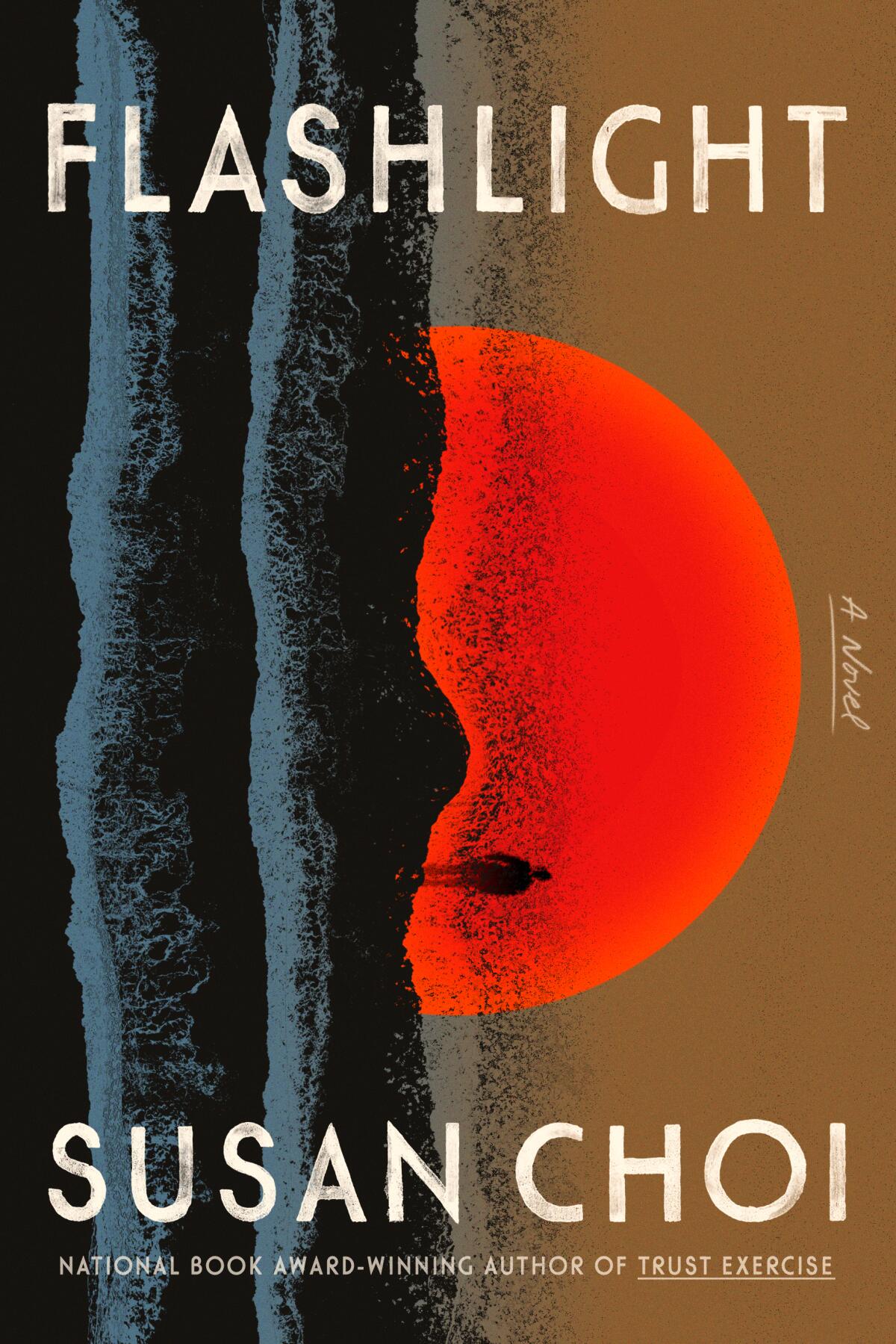Book Review
Flashlight
By Susan Choi
Farrar, Straus & Giroux: 464 pages, $34
If you buy books linked on our site, The Times may earn a commission from Bookshop.org, whose fees support independent bookstores.
While genre fiction steadily advances onto bestseller lists, realism soldiers on, amid cyborgs and dragons and boozy detectives. Innovative novels from Ann Patchett and Claire Lombardo are rooted in ordinary lives, magic tricks kept to a minimum. Now the formally restless Susan Choi turns to social realism in her beguiling if baggy “Flashlight,“ mapping a family’s journey among political autocracy and personal pain, from Midwestern cornfields to the Pacific Rim.
Seok “Serk” Kang, a taciturn professor at a Michigan university, accepts a year’s appointment at a college in a Japanese town close to Osaka in 1978. He’s accompanied by his white wife, Anne, and their adored 9-year-old, Louisa. Serk contains multitudes: the eldest son of a Korean couple displaced by war, he was raised in Japan, where he was known as Hiroshi. He’d distanced himself from his parents’ communist sympathies, disapproving of their repatriation to North Korea, opting instead for an academic career in the U.S. He’s betwixt and between, a country of one. It’s a fraught moment for a move: stagflation stalks the globe; the marriage flounders; Anne’s health flags (eventually leading to a diagnosis of multiple sclerosis), and the precocious Louisa asks probing questions. There’s also Tobias, Anne’s son from a youthful fling, for whom she’d waived legal claims after his birth; he’s caught wind of the family’s plans and lives nearby, a 19-year-old vagabond eager to connect with his biological mother.
The year abroad is a kind of homecoming for Serk, yet it’s cut short one August evening as father and daughter stroll across a beach while on vacation. He’s carrying a flashlight when he vanishes; his body is never found. Louisa is discovered face-down amid the shoreline’s foam, almost drowned. This mystery kicks off “Flashlight,” propelling the plot forward, backward and sideways. With Franzen-esque fastidiousness, Choi unpacks each character’s backstory, exposing vanities and delusions in a cool, caustic voice, a 21st century Émile Zola. Her period details are spot on, candy for those of us who were children during the Carter presidency: hot plates, instant coffee, accordion files, “Smokey and the Bandit.” (I was hoping for a Sleestak cameo — if you know, you know.)

(Farrar, Straus & Giroux)
Choi weaves long, sinuous sentences, teasing out the aftermath of Serk’s presumed death. His wife and daughter’s troubled relationship is the novel’s pole star: “Flashlight” is less about the absent Serk than the omnipresent, annoying Anne. Settled in a working-class Los Angeles neighborhood, invalid parent and rebellious child clash: Anne “never so much as misted an eye when Louisa could see,” Choi writes. “She was aware that Louisa regarded her as an unfeeling person, a sort of robot whose heart — if she even had one — must be made of the same dull aluminum, cold to the touch, as those hideous crutches all but fused to her arms.”
Louisa heads east to an elite university (a thinly disguised Yale), putting a continent between her and her mother. The book’s middle section is bulky with their dramas, which Choi approaches like a documentarian. She wants to get their story right, even if she risks a narrative doldrum. A European sequence drags on and on, overstaying its welcome, but it also underscores Louisa’s divided self as well as Choi’s deep ambivalence about status and privilege. The Ivy student finds herself friendless and franc-less in Paris, boarding a cheap bus to London: “Beyond the station was a wide black trench of oily water that was somehow the Seine. It seemed to Louisa that there were two Parises, the famous and beautiful one to which Christiane held the keys, and the other, where the cigarette butts and empty eau gazeuse bottles and people like Louisa belonged.”
Choi flirts with the conventions of political thriller, too, recalling the shadowy resistance groups in Ed Park’s prize-winning “Same Bed Different Dreams.” Chapter by chapter, “Flashlight” inches back to its opening, scattering clues to the puzzle of Serk’s disappearance. Is it random tragedy or something more? A stray orange cat; a séance in a hostel; a “nearsighted galoot” who decodes cryptic messages from Radio Pyongyang; flashlights that aren’t just flashlights — these bread crumbs guide us to the novel’s denouement.
Her prose occasionally shades purple: “Not her fault, then, if her nerves could be considered not-her,” Anne reflects on her disease, “and what else could they be, those shredded nebulae whose feeble glow reached Anne’s imagination across light-years of the void of her ailing insides?” The author could have trimmed rhetorical flourishes and excessive explication, shaved off a few adjectives and adverbs; yet the power of “Flashlight” derives from its exacting psychological portraits, Choi’s reconnaissance through the tradition of social realism, the rich tension between her natural cynicism and a desire for empathy.
As in Park’s Pynchon-style satire and Angie Kim’s affecting “Happiness Falls,” “Flashlight” explores the collective experiences of Korean Americans, agonies closeted away, the rage that screams inside. The term generational trauma may seem abstract to some, a cliché to others, but Choi makes it concrete, like Louisa’s red backpack or Serk’s electric torch. She brings her impressive literary toolbox to bear here, and the novel ranks among her best work, alongside “American Woman” and the National Book Award laureate “Trust Exercise.”
Cain is a book critic and the author of a memoir, “This Boy’s Faith: Notes From a Southern Baptist Upbringing.” He lives in Brooklyn, N.Y.

